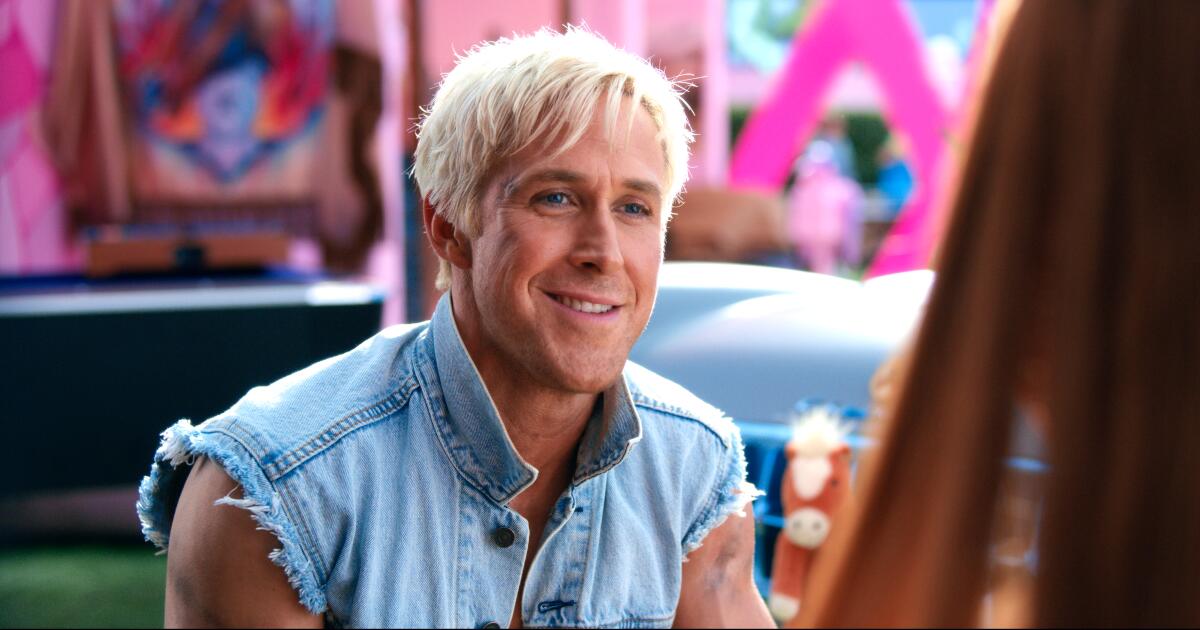Not ‘just Ken’: Mattel shares Barbie’s longtime boyfriend’s full name
At the 2024 Oscars, Ryan Gosling, reprising his role as Ken in Greta Gerwig’s 2023 movie “Barbie,” donned a bedazzled pink suit and belted the ballad “I’m Just Ken.”
“I’m just Ken, anywhere else I’d be a 10,” the actor sang. “Is it my destiny to live and die a life of blond fragility?”
Barbie’s needy male counterpart, it turns out, is not “just Ken.” His full name is Kenneth Sean Carson, according to Mattel, which says the doll saw a uptick in popularity in the years following the hit movie’s release.
Ahead of Ken’s 65th birthday, the El Segundo-based toy giant shared a laundry list of niche biographical details about the doll, including his official “birthday” — March 11, 1961, making him a Pisces — as well as his relationship history with Barbie.
The company said in a statement Monday that Ken has “experienced a resurgence in recent years.”
A Mattel spokesperson cited the “Barbie” movie as a driving factor, as it showed a “different side” of Ken. In a meta move, the company later in 2023 released Ken dolls modeled after Ryan Gosling’s portrayal of Ken.
The “Kenbassador” line launched last year was a “great success,” the spokesperson said. The first product in that toy series was a $75 doll modeled after basketball player LeBron James released in April.
Mattel says it does not break out sales of Ken dolls, but in 2017, when Mattel unveiled Ken dolls with different body types, including one that invited “dad-bod” comparisons, the company told the Wall Street Journal that, on average, girls have one Ken doll for every seven Barbies they own.
Ruth Handler, the creator of Barbie, named the original doll after her daughter, Barbara. The glamorous doll, unique in that it depicted a grown woman rather than a baby, was an instant hit when it debuted at the New York Toy Fair in 1959. Barbie has significantly evolved in the decades since. Recent additions include Barbies with Type 1 diabetes and another with autism.
The Ken doll, created in 1961, was named after Handler’s son, Kenneth. He featured molded hair, wore red swim trunks and carried a yellow towel.
Kenneth Handler told The Times in a 1989 story that there were few similarities between him and the doll named after him. He died in 1994.
“Ken doll is Malibu,” he said. “He goes to the beach and surfs. He is all these perfect American things.”
But when Kenneth Handler was at Hamilton High School in Beverlywood, he “played the piano and went to movies with subtitles.” He continued, “I was a nerd — a real nerd. All the girls thought I was a jerk.”
Like Barbie, Ken dabbled in many different careers over the decades. There have been doctor, pilot, tennis player, firefighter, lifeguard, barista and even Olympic skier Kens, among many others. In 2006, he received a “mid-life makeover” from celebrity stylist Phillip Bloch.
According to the company, Ken and Barbie “met” on the set of their first television commercial in 1961 and soon began dating. After more than four decades, the doll couple broke up in 2004, but reunited in 2011.
Mattel was founded by Ruth Handler; her husband, Elliot Handler; and Harold “Matt” Matson in 1945 in a Los Angeles garage. The toy maker became a publicly traded company in 1960.
Mattel, which also owns Fisher-Price and Hot Wheels, wrote in its October Securities and Exchange Commission filing that “industry-wide shifts in retailer ordering patterns” pushed its third quarter net sales down 6%.
In 2024, Barbie gross billings — which measure the total value of products Mattel ships to retailers before sales adjustments — were down 12% from 2023, which had seen a boost from the movie, according to the company’s annual SEC filing.
